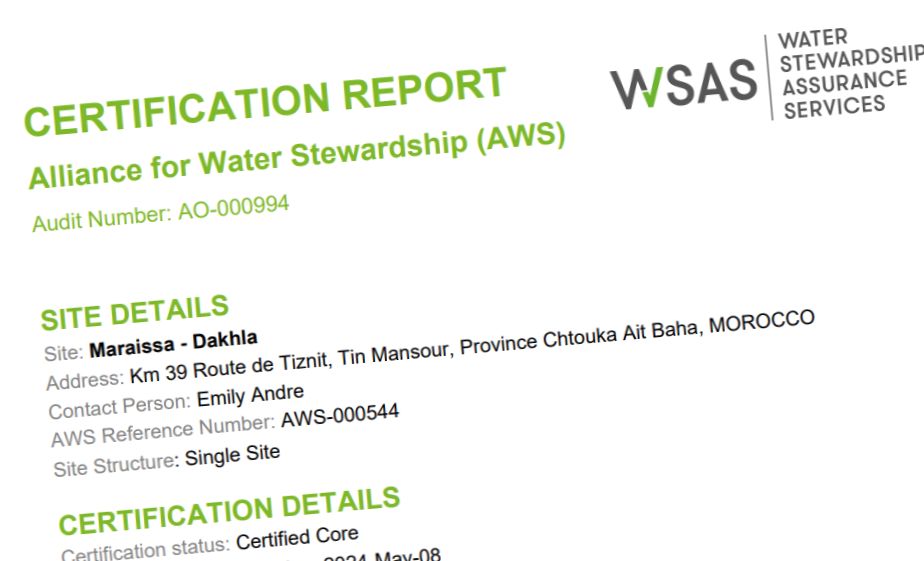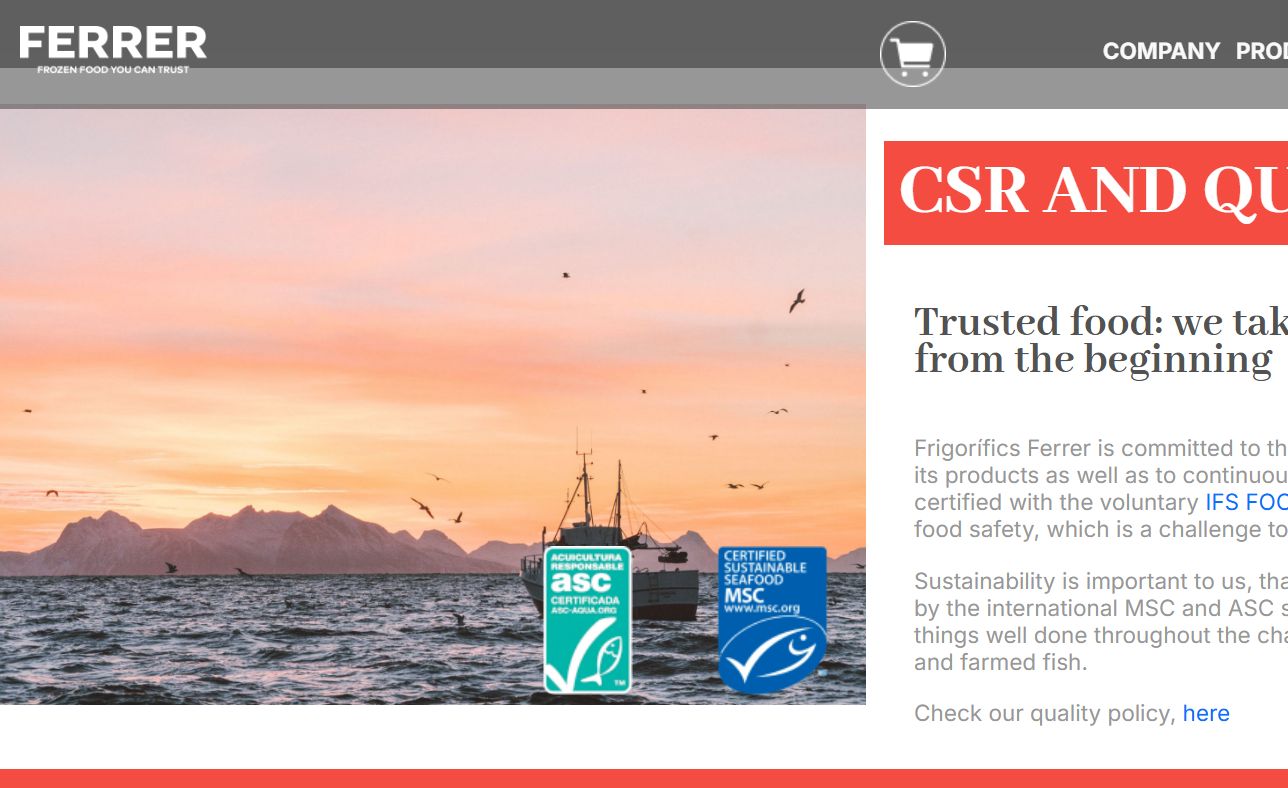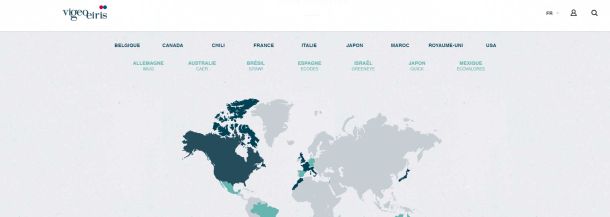
An organisation that promotes responsible use of freshwater lends a hand to the controversial French-Moroccan agri-business Azura in occupied Western Sahara.
“Azura Group has received the Alliance for Water Stewardship (AWS) Certification for its horticultural sites in Agadir and Dakhla cities in Morocco. The AWS Standard aims to drive social, cultural, environmental, and economic benefits at site and catchment levels”, the French-Moroccan agri-company Azura mentioned in a press release last year.
The “certification highlights Azura's commitment to water stewardship and represents a step towards addressing water-related challenges in the horticulture sector in Morocco”, the Scottish based Alliance for Water Stewardship posted on LinkedIn on 26 June 2024.
Azura obtained the certificate for having been found to meet the requirements of the AWS Standard for the Dakhla sites. The certificate was issued in May 2024 after the conformity assessment body Water Stewardship Assurance Services (WSAS) carried out an audit, including onsite visits to six of Azura’s eight farms in Dakhla in occupied Western Sahara. See the lengthy certification report from May 2024 [or download].
The AWS Standard - owned by the Alliance for Water Stewardship (AWS) - is a framework that companies, farms or other water users can follow to use water responsibly. It is a standard that Azura now actively refers to in the marketing of the controversial production taking place in the occupied territory.
But the WSAS report auditors seemingly haven't had the faintest idea of where they undertook the Azura audit.
- The site address is wrong. The “Site details” explain that the location of the site is “Km 39 Route de Tiznit, Tin Mansour, Province Chtouka Ait Baha, MOROCCO”. That is in fact the address of Azura’s site in Agadir in Morocco, not the facility in question where the onsite visit took place. The registered address is 1,200 kilometer drive from the site that was inspected.
- The report states that “The facility is in the Sakia El Hamra region”. This is incorrect. Morocco’s illegal administrative division of the occupied territory and inclusion into the Moroccan administrative system (occupying powers are not allowed to treat an occupied territory in such a manner), entails that two administrative regions cover Western Sahara: ‘Laayoune-Sakia El Hamra” to the north and “Dakhla-Oued Ed-Dahab” to the south. The “Sakia El Hamra region” mentioned in the AWS report is neither the location of the Azura’s facility in Dakhla nor the one in Agadir. It is a region one has to drive through on the way from the incorrect site address and the actual site.
- The facility is placed in the wrong country. The Dakhla site is not in Morocco, but in the territory of Western Sahara. This error is systemic in all AWS’s references to the Azura facility, including on its map of certified sites globally [or download]. This has the most far-reaching implications, both politically and in terms of AWS and its auditors likely having failed to address the complex issues of legal compliance, international law and human rights involved in auditing an operation on illegally occupied land.
Controversial
Azura’s production is rather controversial, massively producing tomatoes on Moroccan permits in occupied Western Sahara, for exports to the international market.
EU-Morocco agreements covering the territory of Western Sahara and exports to the EU market have been addressed ten times by the EU Court of Justice. In all cases, the court found that the two territories are separate and distinct, and that agreement requires Saharawi consent. The court found that the requirement of consent has not been met. Some of the rulings relate to the Moroccan agricultural production and export to the EU. Morocco illegally occupied the Dakhla area in 1979, to UN condemnation.
The 2024 AWS certification audit report correctly informs that “Azura is a private Franco-Moroccan family group created in 1988”. However, at no point does the report put in question how a Franco-Moroccan family could have the right to undertake industrial farming on a piece of land that is neither part of France nor Morocco. To the contrary, it makes statements as “Over more than 30 years, it has become one of the leaders in cherry tomato production, with 1 200 hectares crops Morocco.” The report is a fascinating reading that actually reveals details of the Azura farming operation on the occupied land.
There is no reference in the report to the real location of the plantation - which is in the territory of Western Sahara. It never addresses the ten CJEU rulings, nor takes the rulings’ findings into account. To the contrary, the audit report outlines that Azura has a system set up “for local legal requirements and also the requirements for exporting to Europe.” It is not known what Azura has done to obtain Saharawi consent, nor to label the products in the correct manner in accordance with the EU case law on labelling of products from the territory.
The auditors’ approach is contrary to the CJEU rulings’ requirements. It treats the production as if the Moroccan government has a legal right to the territory. See for instance this fascinating segment:
“During the audit process it was discovered that there were many more stakeholder which are relevant to the site than those of which were presented as having been identified. Missing stakeholders: - ONEE: Office National de l'Electricité et de l'Eau -Branche Eau (National Office for Electricity and Water- Department of Water) - CRI: Conseil Régional de l'Investissement (Regional Investment Council) - Ministère de l'équipement et de l'eau: Ministry of Equipment and Water - Regional representative - Ministère de l'Intérieur: Ministry of Interior- Regional representative - Ministère de la transition énergétique et du développement durable- Ministry of energy transition and sustainable development-Regional representative - Agence Nationale des Ports: National Agency for seaports/ they are in charge of the implementation of Dakhla port”.
With reference to the water that Azura is currently using, the report notes that "the strategic management of the resource is led by the government" and that the site has "provided a comprehensive presentation of the current state of water governance in Morocco as a whole, who the main agencies are and the state of water in the country." WSAS did not respond why it believes the government of Morocco has any authority to use the ground water of the territory of Western Sahara, or how it believes Morocco can grant such water use permits to Azura.
Most of the original inhabitants of Dakhla sought refuge abroad after Mauritanian and later Moroccan military forces occupied the peninsula in 1975 and 1979, respectively. Today, this population lives in refugee camps in Algeria. On 23 June 2025, UN agencies operating in the camps issued a press release highlighting the alarming rise in severe malnutrition. Meanwhile, the maps shown in the WSAS audit report indicate that the water of the “Sahara Aquifer” remains insufficiently mapped. Notably, parts of the aquifer’s eastern boundary align closely with the 2,000+ km landmine barrier constructed by Morocco in the 1980s. Given that some of Dakhla’s original inhabitants continue to rely on pastures east of this barrier, on land not under foreign occupation, WSRW asked WSAS what safeguards exist to ensure the refugees from Dakhla are not deprived of vital water resources as a result of Morocco’s and Azura’s water management activities on their lands, but did not obtain a response.
Same family
The ties between the conformity assessment body Water Stewardship Assurance Services Ltd. (WSAS) and the Alliance for Water Stewardship (AWS) - the body that developed the AWS Standard - seem tight knit.
WSAS is spun out from AWS to handle audits specifically under the AWS system. WSRW asked WSAS how this close relationship may undermine the perception of independence needed for such a body, without obtaining response.
AWS and WSAS are indeed separate legal entities and the WSAS website notes that its board is “majority independent”. However, WSAS is wholly-owned by AWS. The latter has "significant control" over WSAS, and the right to appoint or remove directors. WSAS and AWS have overlapping boards and are located at the same physical address in Scotland. It is not clear what sort of governance, funding or oversight of WSAS still remains with AWS.
In most third-party certification systems, the standard-setter (in this case AWS) must be separate from the certification/audit body (in this case WSAS), as well as from the company under audit (in this case Azura). This separation is essential for credibility, transparency and neutrality, and to avoid that the standard owner both controls the rulebook and the referee.
Had Azura used another of the AWS-approved CAB - such as DNV - for this assessment, the request would likely have been flatly rejected, as DNV has a policy of not conducting audits in Western Sahara.
In addition to holding an AWS certificate, Azura is also a “member” of AWS (see the latter's website [or download]). This membership grants Azura the right to participate in the voting process related to the revision of the AWS Standard, as well as in the nomination and election of members to the AWS Board and Technical Committee, which oversee the standard.
In its letter to AWS CEO Adrian Sym dated 6 December 2024, WSRW asked what steps AWS would take vis-à-vis Water Stewardship Assurance Services, the Azura Group, and the issued certificate, as a consequence of WSRW’s concerns. This letter was never responded to. The AWS CEO Adrian Sym is also a board member of WSAS. On 1 July 2025, WSRW asked Adrian Sym whether any other board members of WSAS apart from Adrian Sym had been informed about the letter WSRW sent to the CEO of AWS, Adrian Sym. The question was not responded to. It is not known whether WSRW’s letter of 6 December 2024 was shared with the technical committee of AWS.
WSRW asked WSAS board member Mr. Sym whether the company's management had been guided by AWS leadership - where Mr. Sym serves as CEO - regarding how the Standard should be interpreted in the context of illegally occupied land. Mr. Sym did not respond to the question.
Alliance For Water Stewardship is registered in the Scottish Charity Register and its board is visible on the organisation's website. WSAS is listed in the UK company register with a board consisting of Frank Brinkschneider, Lucy Frazer, Kathleen Shaver, Adrian Sym and Max Wiesendanger.
A public prior announcement informed about the on-site Azura audit undertaken by WSAS [or download] in the occupied territory. A separate audit report was issued in 2024 regarding Azura’s plant in Agadir [or download].
WSRW wrote to AWS on 6 December 2024, and to WSAS on 1 July 2025, but has not since obtained a response.
WSRW wrote to Azura on 2 December 2024 about its production in the occupied territory, without obtaining a response.
Since you're here....
WSRW’s work is being read and used more than ever. We work totally independently and to a large extent voluntarily. Our work takes time, dedication and diligence. But we do it because we believe it matters – and we hope you do too. We look for more monthly donors to support our work. If you'd like to contribute to our work – 3€, 5€, 8€ monthly… what you can spare – the future of WSRW would be much more secure. You can set up a monthly donation to WSRW quickly here.
MSC’s name misused to whitewash controversial fish trade
The certification scheme MSC guarantees that no fisheries in Western Sahara are certified. But Spanish food distributors give another impression.
German trade fair should stop promoting Azura, groups say
German and Irish law organisations demand that Messe Berlin ceases to accept the controversial French tomato producer Azura.
Vigeo Eiris: two years without answer on support to occupation
The UK-French company Vigeo Eiris certified and defended a Moroccan-Saudi energy project in occupied Western Sahara. WSRW calls on the board to engage on the matter.


